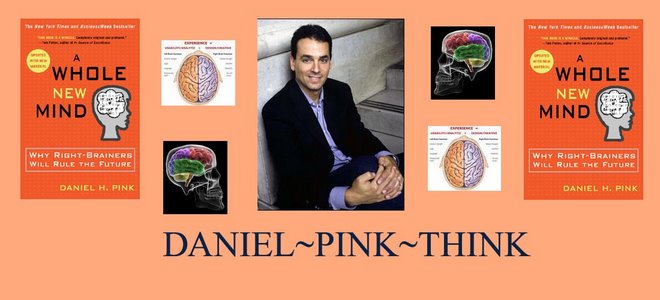Recap of the fourth iRead meeting
on Daniel Pink’s book, A Whole New Mind,
Chapter Three: “High Concept, High Touch.”
Brad Iftner, Director of the Academic Technology Center, began the discussion with a personal story about being identified in elementary school as left brained due to his structured approach to his assignments. It was observed that he was left-handed which is often a trait of a right-brained person. We reviewed the chapter and discussed the economic transition from the Agricultural Age to the Conceptual Age. The Conceptual Age is high touch, such as the current emphasis on customer service and making the consumer feel you care.
The discussion continued noting that the aging baby boomers in large part are in a time of their lives where they are seeking more meaning in life. For some this is retirement and for others it may be a change in careers. We are so closely identified with our jobs, that often it is hard to stop working. For some there is much meaning in their work.
We also discussed the section where the author mentioned that GM was in the “art business,” and as GM goes so goes America. We questioned this new approach in light of the recent economic crisis. It was brought up that is was a poor example as GM really did not take risks and only gave lip service to creativity. One participant mentioned attending the World’s Fair twenty or so years ago where they exhibited the automated house of the future. In the garage was an electric car. We wondered why development of the fuel efficient automobile was held back. The automobile industry was short sighted and “afraid to dare.” The movie “Tucker” was brought up to illustrate that sometimes good ideas are often not accepted. In this true story, a new type of automobile was designed in1949 but did not succeed due to industry opposition.
The discussion moved on to our current educational system that is test driven and left-brained centered. It was mentioned that many colleges and universities are moving away from using the SAT scores toward assessing conceptualization. Creativity seems to be pounded out of students to the point that they lose the ability to know how to create.
Some creative students light up when concepts can be taught using computer gaming. Applications using this technology have a lot of potential in the educational process.
The MBA/MFA issue was discussed, noting that many successful MBA graduates are very creative and have the ability to think differently. Some MFA programs can limit creativity and not allow students to think creatively, but mold them to the institution. What is needed is a marriage of the two. Again, it seems right and left brain abilities combined are best in creating a whole new mind.
Brad Iftner, Director of the Academic Technology Center, began the discussion with a personal story about being identified in elementary school as left brained due to his structured approach to his assignments. It was observed that he was left-handed which is often a trait of a right-brained person. We reviewed the chapter and discussed the economic transition from the Agricultural Age to the Conceptual Age. The Conceptual Age is high touch, such as the current emphasis on customer service and making the consumer feel you care.
The discussion continued noting that the aging baby boomers in large part are in a time of their lives where they are seeking more meaning in life. For some this is retirement and for others it may be a change in careers. We are so closely identified with our jobs, that often it is hard to stop working. For some there is much meaning in their work.
We also discussed the section where the author mentioned that GM was in the “art business,” and as GM goes so goes America. We questioned this new approach in light of the recent economic crisis. It was brought up that is was a poor example as GM really did not take risks and only gave lip service to creativity. One participant mentioned attending the World’s Fair twenty or so years ago where they exhibited the automated house of the future. In the garage was an electric car. We wondered why development of the fuel efficient automobile was held back. The automobile industry was short sighted and “afraid to dare.” The movie “Tucker” was brought up to illustrate that sometimes good ideas are often not accepted. In this true story, a new type of automobile was designed in1949 but did not succeed due to industry opposition.
The discussion moved on to our current educational system that is test driven and left-brained centered. It was mentioned that many colleges and universities are moving away from using the SAT scores toward assessing conceptualization. Creativity seems to be pounded out of students to the point that they lose the ability to know how to create.
Some creative students light up when concepts can be taught using computer gaming. Applications using this technology have a lot of potential in the educational process.
The MBA/MFA issue was discussed, noting that many successful MBA graduates are very creative and have the ability to think differently. Some MFA programs can limit creativity and not allow students to think creatively, but mold them to the institution. What is needed is a marriage of the two. Again, it seems right and left brain abilities combined are best in creating a whole new mind.



